- Home
- Julie Smith
House of Blues Page 2
House of Blues Read online
Page 2
Do married people ever really like each other, or is it always this way? He doesn't like me or he wouldn't have other women. And I haven't liked him since . . . when?
Since the time the children started coming, probably. You fall in love and then you have children,and you lose all sense of everything but that, and then one day you look across the table and you think, "What am I doing with this jerk?"
* * *
Reed's house was beautiful, even bigger and better—restored than Sugars own. Reed wasn't much of a gardener—had only a few perennials blooming—and the house was plain white with green shutters; Sugar would have done something more imaginative with it.
But it was freshly painted and graceful, a Victorian with a wonderful huge front porch supported by Ionic columns.
The front yard was enormous. Two giant oaks grew there, dwarfing a small forest of bananas.
Sugar entered the yard through the small iron gate and walked briskly up to the porch, finding the view before her very pretty indeed.
She fit the key in the lock, turned off the burglar alarm, and relocked the door. Just as she headed up the stairs, she heard the phone ring. Was it quickest to dash up the stairs or race down and try to catch the call in the kitchen? She opted for the kitchen and got there just as the phone stopped ringing.
"Hello?" she said, but Reed's voice on the machine floated above hers, saying she wasn't home but the caller could leave a message.
Sugar would have hung up, but the caller had heard her.
"Hello?" said a man's voice. "Reed, is that you?"
When Reed's alter ego had stopped speaking, Sugar said, "It's Sugar Hebert, Reed's mother. Can I take a message for her?"
"Why, Sugar, how are you, dear lady?" She tensed at something forced in the voice, something falsely hearty. "This is Milton Foucher, Dennis's father. It is a pure delight to hear your voice."
"It's good to hear yours too, Mr. Foucher." She had met him once—at Reed and Dennis's wedding—and she was quite sure she wouldn't recognize him if he walked in right now.
"How have you been, Sugar?"
"Just fine. How've you been? And Mrs. Foucher?"
"Oh, as fine as frog hair, Sugar. We are doing splendidly. Indeed we are."
Why couldn't he talk like a normal person? Hadn't he ever heard of contractions? Sugar was about to ask him if she could take a message, but he said, "We heard Hebert's was awarded the concession for the casino restaurant."
"Yes, we got it."
"Well, congratulations on that. We are very very proud of you."
Sugar fought to keep her snobbery under control. A part of her knew that Milton Foucher was a polite (if pretentious) man who'd had too many children too late in life and that he had suffered a lot—mostly due to his youngest, Dennis.
Another part of her didn't want to admit she was related to him, even by marriage.
"Thanks a lot, Mr. Foucher; I appreciate that. Could I—"
"We were so happy for you when we heard about it. That is a very important plum for you."
"It's going to keep us all pretty busy, I expect."
"I only wish Dennis had gone into that business"—his voice was full of regret—"but what can you do with youngsters? You have to let them do what they want to do—there's no help for it, is there?"
"There sure isn't." She hoped her voice didn't betray the bitterness she felt.
"Well, I had better not keep you. I have some sad news for Dennis."
"I'm afraid he isn't here right now. Could I give him a message?"
"Well, if you would, please. Tell him Justin is not expected to live out the week."
Sugar searched her memory. Was Justin a relative? "I'm sorry to hear that," she said.
"This thing is a terrible waste." Sugar could almost see him shaking his head. "A terrible, terrible waste."
"I'll be sure and tell him."
Hanging up, she looked at her watch and hurried to get the overalls. She'd been gone nearly twenty minutes, and it would take her ten more to get back if she hurried instead of getting into conversations and peering into everyone's garden. She hoped they wouldn't still be yelling when she got there.
She raised a hand to set the alarm, but couldn't remember the combination, punched out with such dispatch when she came in. Now her mind was a blank. She had to sit down and focus till it came to her.
She walked briskly back, but when she saw a pair of teenage kids with reversed baseball caps coming down the street, she crossed and circled a block that wasn't on the way. She'd probably lost five minutes, with one thing and another. She was starting to feel guilty.
She picked up her pace.
Finally, arriving slightly out of breath, she remembered she hadn't brought her purse, had simply picked up Reed's key and hurried out.
Feeling silly, she rang her own doorbell and waited. It was probably a full two minutes before she realized no one was coming. Glancing around for Reed's car, she didn't notice it at first, wondered if Dennis and Reed had gotten so mad they'd stalked out. But in that case why hadn't they come home?
She marched to the side of the house and turned over the rock under which she kept an extra key. Letting herself in, she felt for the first time a slight sense of foreboding; the lock didn't give at first, not until she'd turned the key a few times. Could it be the door hadn't been locked? Had she unwittingly locked it herself, then had to fiddle to unlock it?
"Arthur?" she called. Getting no answer, she turned from the hall into the dining room, where her family should have been. Instead there was blood.
Red on the cream walls, splashed as if a kid had filled a balloon with blood and fanned his arm in a great and joyous arc to empty it. But it was as if he'd done it sitting on the floor. The blood was low on the wall, and above the splashes, there was a bloody handprint. Blood was also pooled on the floor.
Blood. Like something in a movie. Or on television; an event in someone else's life.
The heavy mahogany table had been upended. China, silver, and beans had spilled every which way, and chairs were overturned, though not Sally's high chair, which was empty.
Arthur lay on the floor, faceup, eyes open, white shirt soaked red. There was blood on his pants too, at the groin.
The house was so still Sugar's breath sounded like screaming.
2
"Mrs. Hebert? I'm Skip Langdon."
The woman on the porch looked blank. She was as ordinary a woman as Skip had ever seen, though she was trying—she had on a lot of makeup and her dishwater hair had been highlighted and permed. She was a little overweight, not much, really, just slightly round, and wore expensive pink slacks with a sleeveless white knit top to which small pearls had been sewn at the neckline.
"Yes?" she said, as if unable to comprehend why strangers were invading her house.
"Detective Skip Langdon. I'm from Homicide."
"Oh, I see."
Skip had arrived with her platoon, all in the same car, because there weren't nearly enough unmarked cars to go around. They must have looked terrifying, a six-foot-tall woman and three men in suits, advancing like a phalanx. Skip was talking because she had caught the case, meaning it was simply her turn—she'd been next on the list when the call came. She gestured for the others to go in—she'd interview the witness, they could divide up the other chores.
Rather than sad, the woman seemed bewildered and scared out of her mind, though she'd had a little time to calm down. The district officer had arrived first and had called Homicide. All Skip knew was that Sugar Hebert had arrived home to find her husband shot dead in the dining room.
Hebert said, "They're gone. All of them. I only left for twenty minutes."
"Shall we talk in the car?" Hebert looked as if she could stand to sit down.
"Yes. Please. They said I couldn't stay in the house."
"I'm sorry."
"Well, not that I'd want to." They were side by side now, and something passed over Hebert's face that could have been a m
emory—of her dead husband, perhaps.
Another car arrived—Paul Gottschalk from the crime lab and Sylvia Cappello, Skip's sergeant. "Can you tell me what happened?"
"We were having dinner—my husband and my daughter, along with her husband and their little girl. Somebody spilled something on Sally and I went to get her clean overalls. When I came back, it was like it is now. Blood everywhere, and Arthur—"
"The other three were gone?"
"Gone! Disappeared into thin air."
Slowly, Skip drew the story out of Sugar Hebert—how the family had dinner every Monday, how they had recently celebrated Arthur's birthday and he had announced his retirement, but tonight had reneged; how they had fought, the other three, though this one didn't participate. How she had been gone only twenty minutes—thirty at the most—and had come home to find her world in shards.
"Did you touch anything?"
"No. Not even Arthur. I couldn't stand to look at him; it was too . . . that wasn't my husband down there. I just sort of crab-walked to the nearest phone and called the police."
"And where was that phone?"
"In the hall."
In the house. So she had touched something. "Did you call anyone else?"
"My son Grady. But he wasn't home."
"Would you like to call him again?"
"I left a message." She looked around, as if she expected Grady to be in the car.
The obvious explanation, it seemed to Skip, was that the argument had escalated, someone had pulled a gun—probably Dennis—and shot Arthur. Then Reed and Dennis had fled with their daughter.
"Excuse me a minute," she said, and radioed for a district car to check Reed and Dennis's house.
She turned back to Hebert. "Do you know anywhere else they might go?"
"Not really." She looked uncomfortable.
"Are you sure?"
"Well, Dennis's parents live here. But they'd never go there. Why would they?"
"What's their address?" When she had it, she radioed for a check there as well.
"Do you know," she said when she was done, "if Dennis carried a gun?"
"I know he didn't. He and Reed were dead against guns."
"So Reed didn't either."
"No."
"What about your husband? Did he keep a gun around the house? In case of intruders?"
Skip heard running footsteps and looked up to see a young man approaching, his face white, hair disheveled. "Mother? Mother, what's going on?"
"Oh, Grady." Sugar got out of the car, extended her arms and fell against her son, letting out what she'd been holding in. She sobbed against him for a while and then she said, "Oh, Grady, I was only gone twenty minutes."
"What happened?"
Briefly, she told him. Getting out so she could hear the woman, Skip listened carefully, but it was the same story Sugar had told before.
She found Grady a weedy young man, tall and too thin, as if he smoked a great deal and ate little. He had on a white shirt so old it was gray, and a pair of jeans that had been worn a few times since their last washing. He wore glasses and his hair was greasy. Skip introduced herself, staring at his face, assessing him. Like his mother, he looked bewildered, still putting pieces together.
"What happened here?" he asked. "Where are Reed and Dennis?"
"Maybe you have some ideas."
"Me? Why would I?"
"What did your mother's message say?" Skip wasn't sure why she asked the question; it was something about the breathless, pale way he'd arrived.
"It said, 'Your father's been murdered. Come as soon as you can.' "
"Did it really?" She found it hard to believe Mrs. Pretty-in-Pink had been so cold.
"Well, it got my attention." Grady smiled a little nervously, aware he was apologizing for his mother.
"Perhaps you can help us."
But he glanced at Sugar, who was now weeping quietly. "I think I need to call someone to help with Mother."
"I'm afraid you can't use the phone till the investigations finished. We don't seal homicide scenes, but we won't be out for a long time."
"Oh, God, she's going to need a place to stay." He turned to his mother. "Mother, did you call Nina?"
Hebert shook her head.
"I'm going to get her to come over." He left in as much of a flurry as he'd arrived in.
Glad to get out, probably, Skip thought. Something about him didn't strike her as intensely filial.
She and Sugar got back in the car. "How are you feeling?" she asked.
"Kind of numb. I wish Reed were here."
"Tell me about her."
Sugar looked dumbstruck. "Tell you what?"
"What she's like. Where she'd go if she needed a safe haven."
"A safe haven?" Sugar pondered, as if unsure what the words meant. "That just isn't Reed. People would come to her to be safe."
"Does she have friends?"
"Nina. The woman my son's calling. She works for us at the restaurant—she's kind of Reed's assistant."
"You mean her secretary?"
"Oh, no. I mean her right-hand woman. She was Reed's maid of honor."
"Does Reed have other friends?"
Sugar thought. "Not really. She's pretty busy with Sally and Dennis and the restaurant and everything."
"How about Dennis?"
"Oh. Well. His business partner. They run a nursery—Dennis likes plants. Like his mother-in-law."
"Ah, you like plants."
"Flowers. I paint them."
"Tell me something, Mrs. Hebert. If you were someone outside the family, how would you describe Dennis and Reed?"
"A lovely, hardworking young couple. Absolutely devoted to their little girl. Arthur would never give Reed credit . . . Her eyes flashed and her voice started to rise, but she stopped. "I guess that's family business."
Skip let it go for now. She could afford to be patient; before she was done, every secret the Heberts had, every scrap of "family business," was going to be picked over and examined. "Could you do me a favor? Could you step outside with me and point out your car? And Arthur's and your daughter's?"
"There's mine over there. And Arthur's in the driveway."
"I'd like you to show me Reed's."
Sugar opened the car door. "I'll try."
It was dark now. But when she noticed, apparently for the first time, that most of the neighbors were outside, she retreated back to the car. "I don't think I'm up to it. Is that all right?"
"Sure." Skip could get Grady to do it. "Do you have a picture of Dennis and Reed?"
"Inside—shall I go get it for you?"
"I can get it."
"It's on the little table in the living room."
"How about one of Sally?"
"In my purse—on the table in the foyer."
Skip found the purse, checked it for weapons, and asked Paul Gottschalk to photograph and dust it. While he did that, she went in to get a good look at the dining room, to fix the crime scene in her mind, and then found the picture of Dennis and Reed.
It was a wedding picture that showed only faces—Reed's radiant, surrounded by tulle, Dennis's a little daunting. Reed was a classic southern beauty, natural-looking, with straight brown hair and straight white teeth—teeth whose straightness had not come cheap, Skip imagined, but the orthodonture was worth it.
Dennis was another matter. His features were very distinct, his lips generous, his eyes intense. He had a little baby fat, like the young Brando, that softened him, made him slightly vulnerable. But there was something brooding about him.
Heathcliff, Skip thought; but a man who liked begonias—or whatever he had at his nursery—didn't fit the stereotype. For now, she left the photo, giving Paul a little time to get it dusted.
She went back to Sugar. "May I borrow the picture?"
"Of course." But she hesitated.
"For the investigation," Skip said, and Sugar nodded. "May I see the one of Sally? And could you check your purse to see if anything's
been stolen?"
Quickly, Sugar checked her credit cards, checkbook, and money. "Everything's here," she said, and drew from her wallet an Easter snapshot of a pretty towhead in a pink dress. She was holding a basket of eggs.
"Can you tell me what they were all wearing? And their heights, weight, eye color—all that?"
To Skip's surprise, Sugar's lip started to tremble. She tried to control her face but lost the battle. An anguished rasp escaped her, not quite a sob. "Sally!" she managed to gasp. "She must still be wearing the dirty overalls."
Skip said nothing for a few minutes, but the information trickled out: Dennis was dark, Reed was light; he wore jeans, she wore a summer dress with sandals, and Sally wore beans.
Skip wondered what else there was to get. She repeated Sugar's earlier statement: "Reed and Dennis really hate guns."
"Hate them. Feel strongly. Arthur tried to give Reed a little gun to carry around—you know how dangerous it is in the Garden District—but neither of them would hear of it. They said they didn't want to live like that." She turned away for a moment. Gazing back at Skip, she said, "Of course, Arthur had a lot of opinions."
Once more Skip heard a clatter. It was Grady, back with a handsome young woman in tow, a black woman, though probably she'd describe herself as Creole. She was barely beige in color, and she wore her straight hair in a low-riding ponytail.
"This is Nina Phillips. She's our director of sales at Hebert's."
Before Skip could shake hands, Sugar had repeated her performance with Grady—fallen upon Nina Phillips's neck, wailing.
"That's right," said Nina. "Grady's told me everything. You just go on and cry."
It was a good time to talk to Grady. While Sugar wasn't listening, Skip asked him the same question she'd asked his mother. "Tell me a little about Reed and Dennis."
He pondered a moment. Finally, he said, "The couple of the nineties. She's the brains of the operation. Also the brawn."
Skip smiled. She didn't think he was nearly done. "How so?"
"God forbid anyone should call me a feminist—they shoot guys for that in some parts of town—but, look, he's got it easy, she's got it hard. She brings home the bacon and then she cooks it; after changing into some diaphanous frock and also changing the baby, of course. I guess it's like that apocryphal old woman said: 'I makes the livin' and he makes the livin' worthwhile.' "

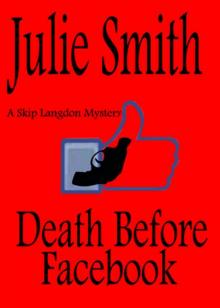 Death Before Facebook (Skip Langdon #4) (Skip Langdon Mystery) (The Skip Langdon Series)
Death Before Facebook (Skip Langdon #4) (Skip Langdon Mystery) (The Skip Langdon Series) P.I. On A Hot Tin Roof
P.I. On A Hot Tin Roof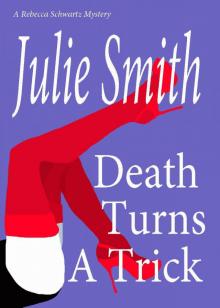 Death Turns A Trick (Rebecca Schwartz #1) (A Rebecca Schwartz Mystery) (The Rebecca Schwartz Series)
Death Turns A Trick (Rebecca Schwartz #1) (A Rebecca Schwartz Mystery) (The Rebecca Schwartz Series) The Axeman's Jazz (Skip Langdon Mystery Series #2) (The Skip Langdon Series)
The Axeman's Jazz (Skip Langdon Mystery Series #2) (The Skip Langdon Series) The Kindness of Strangers (Skip Langdon Mystery #6) (The Skip Langdon Series)
The Kindness of Strangers (Skip Langdon Mystery #6) (The Skip Langdon Series) Louisiana Hotshot
Louisiana Hotshot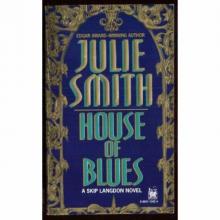 House of Blues
House of Blues Jazz Funeral (Skip Langdon #3) (Skip Langdon Mystery) (The Skip Langdon Series)
Jazz Funeral (Skip Langdon #3) (Skip Langdon Mystery) (The Skip Langdon Series) Tourist Trap (Rebecca Schwartz #3) (A Rebecca Schwartz Mystery) (The Rebecca Schwartz Series)
Tourist Trap (Rebecca Schwartz #3) (A Rebecca Schwartz Mystery) (The Rebecca Schwartz Series) Louisiana Bigshot
Louisiana Bigshot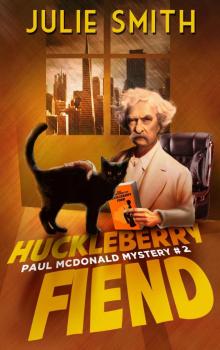 Huckleberry Fiend
Huckleberry Fiend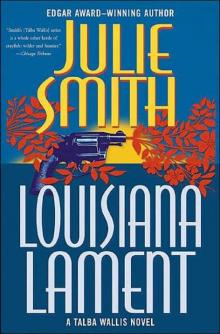 Louisiana Lament
Louisiana Lament Crescent City Connection (Skip Langdon Mystery #7) (The Skip Langdon Series)
Crescent City Connection (Skip Langdon Mystery #7) (The Skip Langdon Series) Dead In The Water (Rebecca Schwartz Mystery #4) (The Rebecca Schwartz Series)
Dead In The Water (Rebecca Schwartz Mystery #4) (The Rebecca Schwartz Series) True-Life Adventure
True-Life Adventure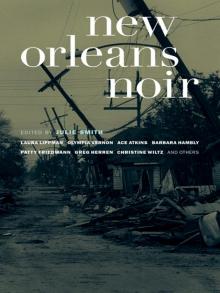 New Orleans Noir
New Orleans Noir